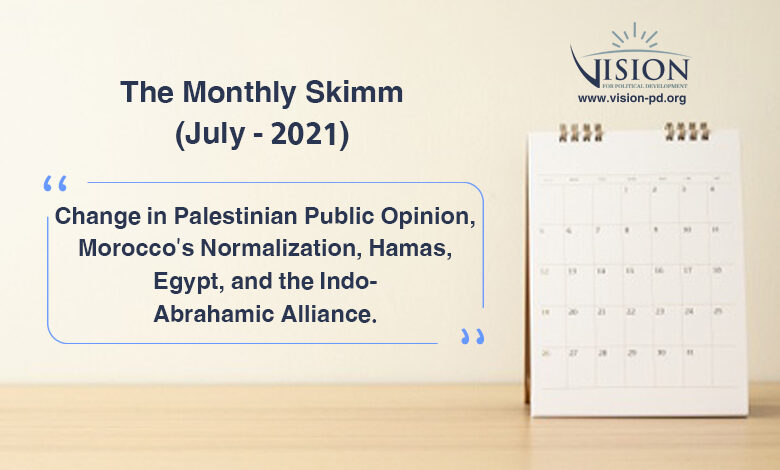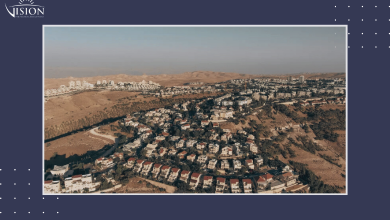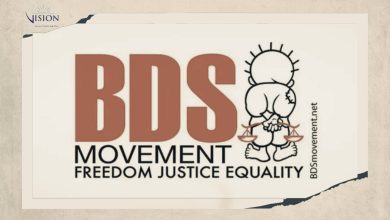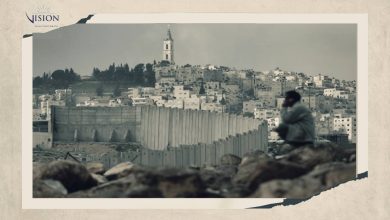Monthly Skimm (July 2021): Change in Palestinian Public Opinion, Morocco’s Normalization, Hamas, Egypt, and the Indo-Abrahamic Alliance.

Mohammed Hasan
Changes in Palestinian Political Public Orientations
Palestinians who desire permanent peace with Israel, including the younger demographic, currently represents the minority, according to the Washington Institute (Pollock, 2021). Specifically, there has been a radical shift in Palestinian public opinion and a trend toward supporting Hamas and armed struggle.
In light of the change in Palestinian public opinion, Pollock and Cleveland have recommended that the United States work more around the economic edges. The growing support of armed resistance against Israel and the desire to reclaim historical Palestine were not influenced solely by the latest confrontation. Rather, it is due to the accumulative effect of years of struggle. For most Palestinians, a one-state solution is more preferred than a two-state solution. The aforementioned authors recommend that the US focuses on the economic dimension based on polls which show that Palestinians, particularly in Gaza, prioritise economic stability over politics.
Lebanon’s Economic Deterioration Does Not Benefit Israel
Schweitzer and Mizrahi warned Israel about the potential consequences of Lebanon’s continuing economic deterioration and existent political chaos (Mizrahi, 2021). They recommend that Israeli leaders adopt a proactive approach lest, in the extreme case, a Hezbollah takeover makes Lebanon into an Iranian sphere of influence at the border. Returning to the nuclear agreement with and rescinding sanctions against Iran could result in increased Iranian influence in the region.
Why Does Egypt Maintain Relations with Hamas?
Multiple goals drive the Egyptian policy with Hamas (Mandour, 2021). Said goals can be understood through the lenses of both domestic and foreign policy. There is a kind of interdependence between the two parties: On the one hand, Egypt needs Hamas’s support in Sinai and also seeks to maintain its regional influence as a mediator to minimize the influence of regional powers such as Qatar and Turkey. On the other hand, Hamas depends on Egypt to maximize the inflow of needed supplies across the Gaza-Egypt borders whether legally or illegally.
Morocco as a Potential Mediator Between Hamas and Israel
Mohammed Chtatou perceives Morocco as a potential mediator in Hamas-Israeli negotiations. Regardless of the dissatisfaction among Palestinians regarding Moroccan-Israeli normalization, Chtatou sees that the direct and indirect members of the Abraham Accords may engender productive negotiations between Israel and Hamas to achieve a lasting peace. Why Morocco? Israel contains almost a million Moroccan Jews, and the current Israeli government includes four Moroccan ministers. The ruling Islamist in Morocco can ease that as the King adopts a positive orientation towards Israel (Chtatou, 2021).
How Should Israel Consider Hamas’s Visit to Morocco?
The pro-Israeli writer Sarah Feuer does not view Hamas’s visit to Morocco as a threat to the bilateral relationship between Israel and Morocco (Feuer, 2021). Although disturbing, the visit is perceived as a domestic political scene issue. Accordingly, she recommends that the Israeli government methodically nurtures its ties with the business community in the country because this group is the most important for achieving successful normalization.
The Gap Between Israel and EU Over the Conflict
Eran and Stein believe that the increased agreement about Israel-Palestine conflict resolution is due to the Israeli government’s policies and day-to-day procedures in the Palestinian populated areas of the West Bank and Gaza. Political rifts on how to approach the conflict can be fixed when the Israeli government stops disturbing the implementation of two-state solution.(Stein, 2021).
Indo-Abrahamic Alliance
As a result the United States withdrawal from the region and the increasing gap between the UAE and the Turkey-Pakistan alliance, there is a new geopolitical alliance being established, namely, the Indo Abrahamic Alliance. UAE, Israel, and India can potentially transform the geoeconomics and geopolitics in the region. This alliance has been built for years but has accelerated in 2020. It does not work as a formal bloc but it can potentially function effectively due to the Abraham Accords. Additionally, it can work in the context of Turkish aggression towards these countries. Interestingly, Greece is pushing to accelerate India’s involvement in regional matters (Soliman, 2021).
Reference:
Chtatou, M. (2021). Could Morocco Help Negotiate between Israel and Hamas? Retrieved from Washington Institute: https://www.washingtoninstitute.org/policy-analysis/could-morocco-help-negotiate-between-israel-and-hamas
Pollock, D. (2021). What Do Palestinians Want? . Retrieved from Washington Institute : https://www.washingtoninstitute.org/policy-analysis/what-do-palestinians-want
Mandour, M. (2021). Egypt’s Shifting Hamas Policies. Retrieved from Carnegie: https://carnegieendowment.org/sada/85037
Soliman, M. (2021). An Indo-Abrahamic alliance on the rise: How India, Israel, and the UAE are creating a new transregional order. Retrieved from Middle East Institute : https://www.mei.edu/publications/indo-abrahamic-alliance-rise-how-india-israel-and-uae-are-creating-new-transregional
Feuer, S. (2021). A Boost in Israeli-Moroccan Normalization? Retrieved from The Isntitute for National Security Studies: https://www.inss.org.il/publication/israeli-moroccan-normalization/
Mizrahi, O. (2021). Lebanon’s Collapse, and the Significance for Israel. Retrieved from The Institute for National Security Studies: https://www.inss.org.il/publication/lebanon-collapse/
Stein, S. (2021). The EU and Israel: At Least on Speaking Terms. Retrieved from The Institute for National Security Studies: https://www.inss.org.il/publication/israel-eu/





